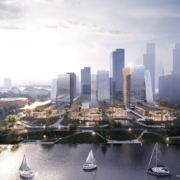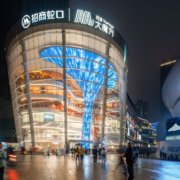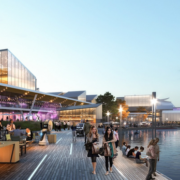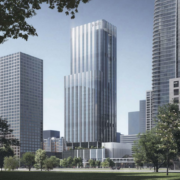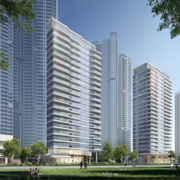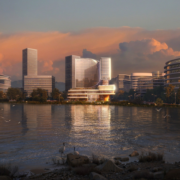Aedas Creates Revolutionary Campus in Wuhan, China

In the ‘City of University’, Aedas Executive Director Kelvin Hu has led the team to create a world-leading campus in Wuhan. The project is located adjacent to the Huazhong Ketaicheng, offering a cradle to cultivate the next generation in an all-rounded learning environment. Kelvin says, ‘To maximise the learning efficiency, the design integrates the key elements to equip the students’ academic studies, presentation ability and social skills. The campus connects to the community seamlessly, providing a comprehensive environment for the youths to grow with knowledge and interpersonal skills.’
A cradle for science innovations

Through the metaphor of breeding knowledge for generations to come, the campus is an interconnected space positioned as the ‘origin of technology’, with different parts of it representing a section of a vibrantly growing plant, together forming a thriving ecosystem of knowledge. Starting from the gate, the main school campus can be found to signify ‘A Bud of the Future’ as an integral part of the system where growth happens.
Moving inward, high-end ecological residential towers are placed along the ‘City Vine’, providing modern residences suitable for contemporary living. The ‘City Forest’ is placed at the northernmost of the plot to include technology headquarters as a stage to cater for the technology elites. With a clear layout stitching various functions, the design also offers a seamless connection to the surrounding community, nurturing the next generation to innovatively create and develop in technological aspects within the well-planned environment.
A stage for the students to shine

The cascading terraces embrace the greenery and sports ground in a U-shaped academic building to form an enclosed courtyard. With such a design, a theatre-like environment is mimicked with the athletic tracks acting like a stage and the academic building acting like a theatre’s seating area. It symbolises how the vision of the school is to serve as a platform for students to thrive and shine with their talents, preparing them towards a path to becoming a high-tech elite.
An enclosed spacious courtyard is created, providing a humane ambience while the classrooms are filled with natural sunlight to offer the students pleasant conditions to learn and recreate. The northwestern side of the athletic tracks opens up and forms a dialogue with the local urban context, showcasing a friendly interface facing the community.

The stadium and canteen are placed underneath the elevated sports ground, creating more public areas for greenery and social gatherings. The multi-function hall is placed above the sports ground, as a connector between the school and community. The glass curtain wall of the stadium injects an urban street view into the interiors, forming a placemaking hub for the city.
An energetic campus for collaboration

With efficient layout and spatial planning, the design creates two open communal spaces for collaboration. One of them closely connects to the academic buildings, while another one merges with the recreational amenities and fronts the community. The spaces create a social hub for the students to equip their communication skills and enhance their social understanding of the urban context and local culture.
The courtyard brings greenery into the interiors, further extending the biophilic vibrancy to the permeable terraces. The integration of nature creates a lush outdoor environment for students to interact after classes. The shared spaces seamlessly connect with the elevated sports ground, creating vertical multi-functional areas for the campus.
Facing the community, the public realm provides amenities like the stadium and library, serving the public as a recreational urban oasis. With well-planned circulation, both communal spaces are lined with privacy to ensure the students’ safety, creating a safe co-working environment for the student body and the public alike. Utilising the urban interface, the campus includes comfortable pick-up zones for parents.
Breeding for the future

The school’s vision aims to create personalised education to activate the students’ potential with a blended teaching model. To stimulate curiosity and to include outdoor interactive learning zones, the adaptive design includes science parks, botanical gardens, badminton and table tennis fields, a multimedia learning centre and extra-curricular corners. It is bound to provide an all-rounded campus to support and nurture students in a comprehensive way.
Kelvin shares, ‘We have designed an integrated campus, adding another institution landmark to the district through a hybrid of technology and ecology. The Wuhan Central China Science & Ecological City Primary School project will be the birthplace of fostering and advocating innovation and critical thinking. Connecting with the community, the campus is set to spread knowledge and vibrancy to the surroundings.’



